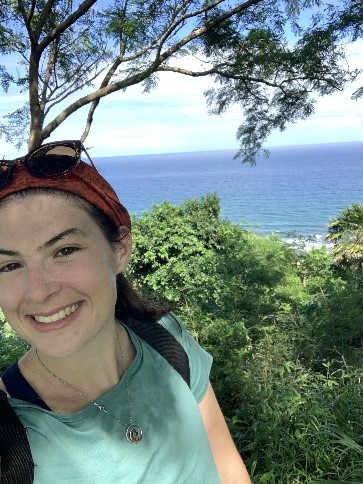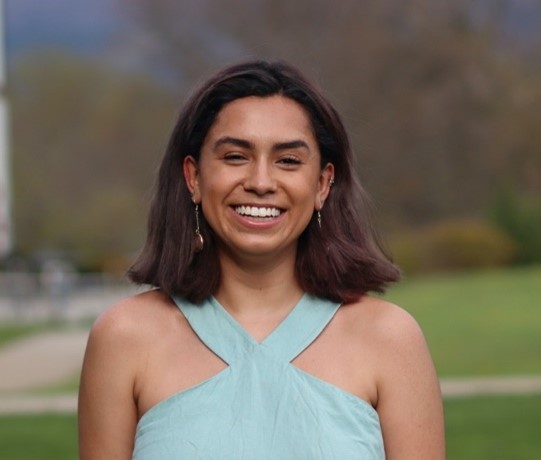
Research Scholarships
The American Academy of Underwater Sciences awards two $3000 research scholarships to graduate students, one Master's program student and one Ph.D. candidate, engaged in, or planning to begin, a research project in which diving is or will be used as a principal research tool or to study scientific diving.
The AAUS may also award two additional $1500 scholarships to the next two proposals that are ranked the highest. If the additional scholarships are awarded, they may be split between the Master's program and the Ph.D. program, or they may be both awarded within a single program. *Please note that persons are not eligible to compete for more than one AAUS scholarship per year, excluding the Kevin Flanagan Travel Award.
Proposal deadline is June 30.
Scholarship winners are announced October 1.
Current Scholars
Doctoral-level Awards
 Dominique Gallery
Dominique Gallery
University of Texas at Austin
1st Place Doctoral Award
Cryptic coral: Disentangling environmental factors that support cryptic lineages of the great star coral, Montastraea cavernosa
I am a fourth year Ph.D. candidate in Dr. Mikhail Matz’s lab at the University of Texas at Austin, where I work on identifying how cryptic genetic lineages differentially reaction to their environments. Prior to graduate school, I interned at the U.S. Geological Survey under Dr. Lauren Toth, assisting with rugosity studies of the Florida Keys reef tract using historic data sets from the Coral Reef Evaluation and Monitoring Project. During this time, I received my undergraduate degree in marine biology from the University of South Florida. My undergraduate research focused on the population structure of Porites astreoides, the mustard hill coral, in the Florida Keys.
My passion for coral reefs led me to my graduate studies, where I focus on using multi-omics approaches to evaluate the intersection between genetics and environment in cryptic lineages of coral. My dissertation examines several aspects of gene expression differences between cryptic lineages of coral, including in-situ approaches, age-related differences, and gene expression mismatch in hybrids between cryptic lineages within a species. For this project, I aim to determine how different genetic lineages of the great star coral, Montastraea cavernosa, respond differently to their environment using genotype-environment associations. This study will combine genomics, transcriptomics, and proteomics to evaluate the fitness of lineages between environments.
With results from this study, I will provide restoration managers with evidence that genotypes within a lineage will be more successful in certain habitats, which should significantly improve future restoration efforts for this species. Restoration of corals is specifically important on reefs, such as the Florida Keys reef tract, where disease, eutrophication, and climate change have decimated populations in recent decades. I want to thank the AAUS foundation for their support of this project, which will assist not only my research, but also restoration efforts for Floridian corals.
 Allison Klein
Allison Klein
Florida Atlantic University
Harbor Branch Oceanographic Institute
2nd Place Doctoral Award
Enhancing Rapid Reef Resilience Through Transplantation of Thermally Tolerant Corals in Oʻahu, Hawaiʻi
I am currently in my second year as a Ph.D. candidate within the Coral Reef Ecology and Health Lab, under the guidance of Dr. Joshua Voss at Florida Atlantic University’s Harbor Branch Oceanographic Institute (HBOI). My doctoral research centers on the identification of thermally resilient coral colonies tailored for large-scale outplanting initiatives. Prior to graduate school, I earned a Bachelor of Science degree in Marine Biology and a Bachelor of Arts degree in Environmental Chemistry, accompanied by a minor in Sustainability, from Roger Williams University. During my four-years at RWU, I had the privilege of serving as an INBRE-SURF research fellow, working closely under the mentorship of Dr. Koty Sharp. My senior thesis research focused on characterizing and assessing dynamics in the microbiome of the northern star coral, Astrangia poculata. During my undergraduate degree, I had the opportunity to study abroad at the Bermuda Institute of Oceanographic Sciences (BIOS) where I achieved AAUS certification. It was during this time in Bermuda that I cultivated my passion for diving and solidified my aspiration to pursue a career dedicated to the exploration and preservation of coral reefs.
After completion of my degree in 2020, I moved down to Ft. Pierce, Florida to begin my master’s degree at HBOI, also advised by Dr. Voss. My thesis research focused on the coral species Orbicella faveolata and its variable susceptibility to stony coral tissue loss disease (SCTLD). Employing 2bRAD genotyping, my research findings indicated that the observed intraspecific disease susceptibility did not originate from underlying genetic factors; rather, it was influenced more significantly by symbiont communities. Now, as I transition into my Ph.D. dissertation, I am shifting my focus to another pressing coral reef stressor: coral thermal tolerance. Given the escalating frequency and severity of coral bleaching events, it is imperative to enhance human-driven initiatives that bolster the adaptive capacity of reefs. However, our understanding of the outcomes of coral transplantation strategies remains largely unknown. To address this critical knowledge gap, my dissertation aims to delineate how coral thermal tolerance is conserved across both spatial and temporal scales. This will be achieved through a comprehensive transplant experiment conducted in O’ahu, Hawai’i.
The financial support provided by the AAUS scholarship will be instrumental in acquiring the necessary tools for initial colony collection and setting up transplantation racks. Any remaining funds from this scholarship will be allocated to facilitate RNA extraction for subsequent gene expression analysis. The capacity of corals to adapt to evolving environmental conditions is paramount for their long-term survival. Gene expression analysis emerges as a pivotal tool in our efforts to assess their adaptive potential and forecast their responses to future climate change scenarios which will help guide conservation and restorative management strategies.
Master-level Awards
 Hannah Merges
Hannah Merges
California State University Northridge
1st Place Masters Award
Increase in Submarine Groundwater Discharge May Adversely Affect Metabolism of the Tropical Coral, Pocillopora acuta
I am a second-year Master’s student in Dr. Nyssa Silbiger’s Quantitative Marine Ecology Lab at California State University Northridge. I have always had a fascination with the natural world and a curiosity to understand more about the environment around me, so I pursued a Bachelor of Science degree from Ursinus College in Pennsylvania in Environmental Studies with minors in Marine Science and Anthropology. My first field experience was in a Research Experience for Undergraduates summer internship in the Maryland coastal bays, where I studied the prevalence of a pathogenic bacteria, Vibrio vulnificus, in blue crabs and the seawater. Two years later, I studied abroad in Panama and had the opportunity to explore a new ecosystem and learn about tropical marine environments. This solidified my passion for committing to a career in marine science, with a specific interest in coral reefs. Thus, I conducted an honors thesis on the effects of temperature and salinity stress on a temperate coral species, Astrangia poculata.
After graduating, I took a gap year to earn my PADI Divemaster certification and worked in coral restoration at Utila Coral Foundation in Utila, Honduras. Through my interests in coral physiology and ecology, I found Dr. Silbiger’s lab, where I am currently deepening my understanding of biogeochemistry and physiology as I study the impacts of submarine groundwater discharge (SGD) on metabolic processes in adult corals. I am interested in assessing how the distinct biogeochemistry of SGD, which differs between geographic regions and from ambient seawater, affects coral respiration, photosynthetic, and calcification rates.
I am incredibly grateful for the funding support from the AAUS Foundation which will allow me to complete my next thesis chapter. The AAUS Master’s Research Scholarship will be used to support the cost of lodging at the UC Berkeley Richard B. Gump South Pacific Research Station in Mo’orea, French Polynesia which includes the cost of SCUBA tanks and boat rentals for the duration of my upcoming field season in January 2024. Additionally, partial funding will be allocated for the costs of titration materials and nutrient analysis of collected water samples.
 Alitzel Villanueva
Alitzel Villanueva
California State University Northridge
2nd Place Masters Award
Water column stratification effects on kelp forest persistence and their communities
I am a 3rd year master’s student in Biology at California State University, Northridge where I am co-advised by Dr. Mark Steele and Dr. Kerry Nickols. For my undergraduate studies I attended Middlebury College where I earned a bachelor’s in environmental studies with a focus in Conservation Biology. There, I was exposed to social issues within life sciences as well as how timely studying the environment is. In addition, while at Middlebury, I completed two Research Experiences for Undergraduates (REU) internships. As a rising sophomore, I participated in the Smithsonian Environmental Research Center (SERC), where I studied rhizobia-legume mutualism. As a rising senior, due to the COVID-19 pandemic, I participated remotely in the University of Michigan’s Biological Station studying inland lake level limnology. These research experiences culminated in me conducting my own undergraduate thesis project in Dr. Eric Moody’s Evolutionary Ecosystem Ecology Lab at Middlebury on the effects of persistent organic pollutants and climate change on Atlantic killifish embryos. All together, these experiences solidified my research interests in the dynamic between biotic organisms and their physical environment as global climates continue to grow increasingly more variable while also illuminating my passion for marine life.
Currently, my studies are focused on how kelp forests along the coast of Catalina Island are affected by changes in temperature. Additionally, I am examining how kelp affects its own forest community. My master’s thesis aims to explore the effects of thermal stratification on kelp forests’ persistence and the indirect effects on fish communities within these systems. This research has real-world impacts as coastal temperature increasingly varies due to climate change. These extreme variations will have unknown impacts on marine animals in these environments, which may have cascading effects on other organisms or ecosystems. This AAUS Masters scholarship will help fund SCUBA tank fills for myself and a dive buddy as well as boat gas, and gear service for my dive equipment so that I can complete my fieldwork to collect data necessary for this research.